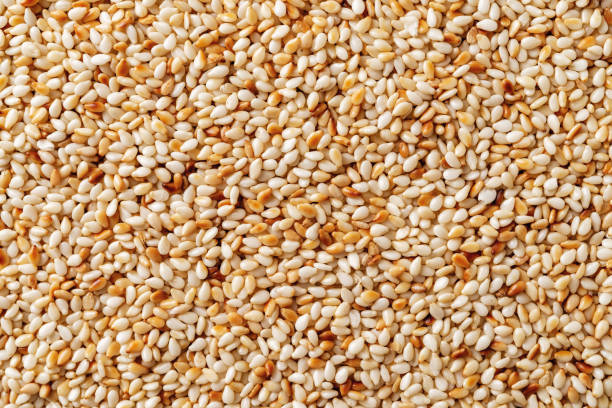Have you ever heard of sesame seeds? Those tiny, crunchy things on Your bagel (bread roll)? Well, in Gombe, Nigeria, they’re not just toppings, they’re golden treasure! This article is all about turning those little guys into big bucks by building a super cool factory that cleans, peels, and polish them until they shine like stars.
Think of it like this: imagine everyone in the world suddenly loves sesame seeds (and Yes! they already do). But not just any seeds, they want the best, the fanciest, the Gombe kind! Your factory will give them exactly that, using whizz-bang machines to make the cleanest, tastiest sesame seeds around.
Here’s the juicy part: people pay big bucks for fancy food, and these sesame seeds will be fit for royalty (or at least fancy sandwiches). You’ll sell them all over the world, making everyone from chefs to grocery shoppers happy and, most importantly, making **us** rich!
But it’s not just about money, you know. By working with Gombe farmers, You’ll help them grow even more awesome sesame seeds and create jobs for everyone. You’ll also be super careful about the environment, using less water and energy, because that’s just the right thing to do.
So, what do you say? Ready to join the sesame gold rush? This plan has all the ingredients for success: awesome seeds, fancy machines, happy people, and a big pile of cash waiting at the end. Let’s do this!
Market Analysis: A Global Appetite for Gombe’s Golden Treasure

Sesame seeds are no longer just sprinkled on bagels; they’re a global superfood on the rise. Driven by growing health awareness and their versatility in cuisines from tahini in the Middle East to hummus in Europe and gluten-free snacks across the globe, sesame consumption is projected to reach a staggering $12.78 billion by 2027. This isn’t just a fad; it’s a seismic shift in the food landscape, and Gombe State, Nigeria, is perfectly positioned to ride this golden wave.
Nigeria itself sits as the second-largest sesame producer in Africa, boasting a robust 500,000 tons annually. But the story doesn’t stop there. While quantity is impressive, it’s Gombe’s premium potential that truly shines. The state’s fertile land and ideal climate nurture a unique white sesame variety renowned for its high oil content and delicate flavor, prized by discerning markets and commanding premium prices.
However, Nigeria’s current processing capacity lags behind its production potential. This presents a golden opportunity for a well-equipped facility like ours. By focusing on premium-grade cleaning, hulling, and sorting, You can cater to the insatiable demand for high-quality sesame seeds in international markets.
And the export landscape shines just as brightly. Nigeria enjoys preferential trade agreements with key sesame importers like the European Union and Japan, paving the way for duty-free access and enhanced profitability. Put simply, Gombe’s sesame sits at the crossroads of fertile land, premium quality, and favorable trade policies, creating a market opportunity ripe for investment.
In essence, Gombe’s golden seeds are not just a delicious snack; they represent a lucrative gateway to a booming global market. Your proposed processing facility, with its focus on quality, value-added products, and ethical sourcing, is poised to not only unlock this potential but also contribute to Gombe’s sustainable development and economic prosperity.
Financial Landscape: Gombe’s Golden Seeds Sprouting Profits
Gombe’s sesame whispers not just flavor but sweet, sweet profit. Analyzing the financial landscape paints a picture of a venture rich with potential, but not without its risks. Let’s delve into the golden nuggets before exploring how to navigate the potential pitfalls.
Profitability Potential:
- Premium Prices: A profitability analysis reveals that sesame seed cultivation yields a return of N2.08 for every N1 invested. Farmers typically face an average total production cost of N60,036.06 per cultivated hectare. Post-harvest, they generate an average revenue of N184,701.98 per hectare, resulting in a net profit of N124,665.92 per hectare. Breaking it down, farmers realize a profit of N12,466.59 per 100Kg bag of sesame and N124,665.92 per tonne harvested. It’s important to note that the cultivation-to-harvest time frame spans from three to four months.
- Export Advantages: Preferential trade agreements translate to lower export costs and higher returns the country generates an average of $1,400 per metric tonne of sesame exported..
- Local Sourcing Efficiency: Direct farm gate purchases or outgrower programs can reduce procurement costs and build long-term partnerships.
Government Incentives:
- Grants and Tax Breaks: Nigeria’s Agricultural Transformation Agenda offers grants and tax breaks for agribusiness ventures, potentially offsetting initial investment costs.
- Infrastructure Support: Government initiatives often involve funding for roads, storage facilities, and power grids, reducing operational expenses.
Risks and Mitigation Strategies:
- Currency Fluctuations: Hedging strategies and diversifying export markets can minimize risks.
- Logistics and Infrastructure: Investing in robust transportation and storage infrastructure reduces dependence on external factors.
- Market Competition: Building a strong brand reputation and focusing on niche premium markets can differentiate the venture.
To estimate specific profitability, detailed financial modeling is crucial. Factors like processing capacity, chosen market segments, and financing options will play a significant role. It’s wise to consult financial experts and conduct thorough market research to build a reliable financial projection.
Remember, financial analysis is a dynamic process. Continuously monitoring market trends, government policies, and competitor activity will be key to adjusting strategies and securing long-term financial success.
By seizing the opportunities and proactively mitigating risks, Gombe’s golden seeds can blossom into a lucrative venture, not just for investors but for the entire Gombe community.
Sourcing of Sesame Seeds
Sourcing the Treasure:
Gombe’s bounty awaits, but how do You unlock its golden potential? Choosing the right sourcing strategy is crucial for quality, efficiency, and sustainability. Here are Your options:
1. Direct Farm Gate Purchases:
- Building trusted relationships: You can directly purchase from Gombe farmers, offering fair prices and secure offtake, incentivizing quality production and fostering transparency.
- Quality control: Direct engagement allows for stringent selection and quality control at the source, ensuring seeds meet Your high standards.
- Community impact: This approach empowers local farmers, providing economic stability and improving livelihoods.
2. Commodity Markets:
- Larger pool of suppliers: These markets offer access to a wider range of suppliers, potentially leading to lower prices.
- Careful selection and quality control: Vetting reputable vendors and implementing rigorous quality checks are crucial to maintain premium standards.
- Limited interaction with farmers: While providing access to large quantities, this method creates less direct impact on local communities.
3. Establishing an Outgrower Program:
- Empowering local farmers: You can provide Gombe farmers with seeds, training, and technical support, promoting sustainable practices and boosting yield and quality.
- Long-term commitment: This fosters stability and loyalty, securing a reliable supply of high-quality sesame seeds.
- Social responsibility: An outgrower program contributes to rural development, creating jobs and improving living standards in Gombe communities.
Sustainable and Ethical Sourcing:
No matter the chosen method, ethical and sustainable practices are paramount. You will prioritize:
- Organic farming: Encouraging farmers to adopt organic methods minimizes environmental impact and produces pesticide-free, premium sesame seeds.
- Fair trade practices: Ensuring fair wages and working conditions for all involved, from farmers to processors.
- Environmental responsibility: Implementing water conservation, waste reduction, and renewable energy sources to minimize Your ecological footprint.
Processing for Perfection:
Once Your treasure trove is secured, it’s time to transform it into golden gems. Your state-of-the-art facility will boast cutting-edge technology for:
1. Cleaning:
- Air screen cleaners: Gently remove dust, debris, and foreign particles, ensuring impeccable hygiene and purity.
- Optical sorters: Eliminate discolored or damaged seeds, guaranteeing consistent quality and premium appearance.
2. Hulling:
- Mechanical hullers: Precisely remove the sesame husks while preserving the delicate kernels, maintaining optimum flavor and nutritional value.
- Air separation systems: Efficiently separate hulled seeds from husk fragments, resulting in a uniform and premium product.
3. Sorting:
- Gravity graders: Separate seeds based on size and density, ensuring consistent product batches and catering to specific market demands.
- Color sorters: Eliminate any remaining discolored or damaged seeds, guaranteeing a visually appealing and flawless final product.
Value-Added Products:
Beyond basic sesame seeds, You can expand Your reach and revenue by creating:
- Sesame oil: Cold-pressed sesame oil has a rich flavor and high nutritional value, catering to health-conscious consumers.
- Sesame paste: Versatile and delicious, sesame paste can be used in dips, spreads, and sauces, tapping into diverse culinary applications.
- Sesame snacks: Healthy and convenient, sesame-based snacks like bars, crackers, and trail mixes cater to the growing demand for on-the-go options.
By diversifying Your product portfolio and focusing on high-quality processing, You can unlock the full potential of Gombe’s golden treasury, offering premium products to discerning markets around the world.












